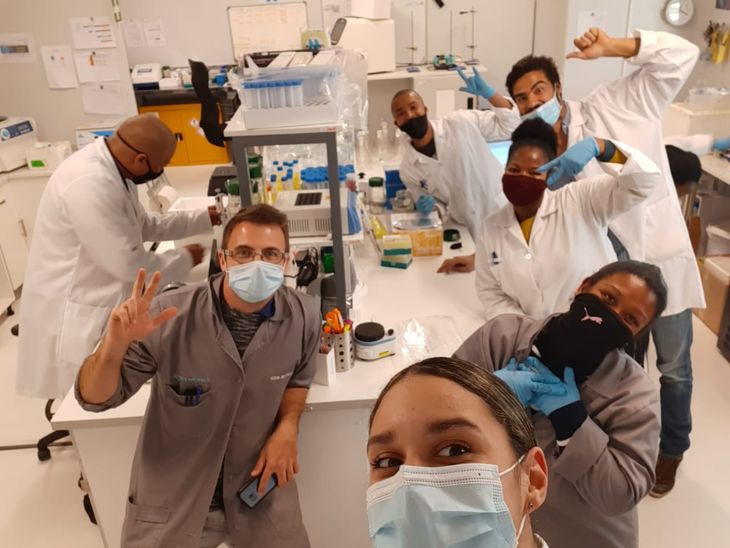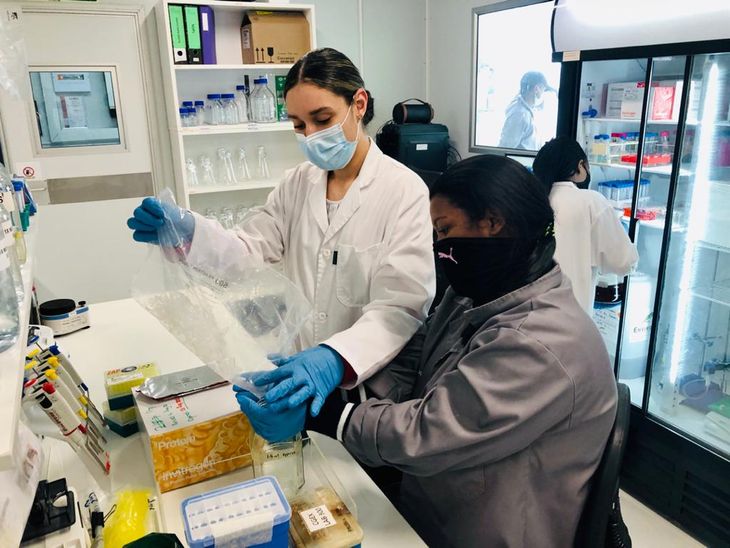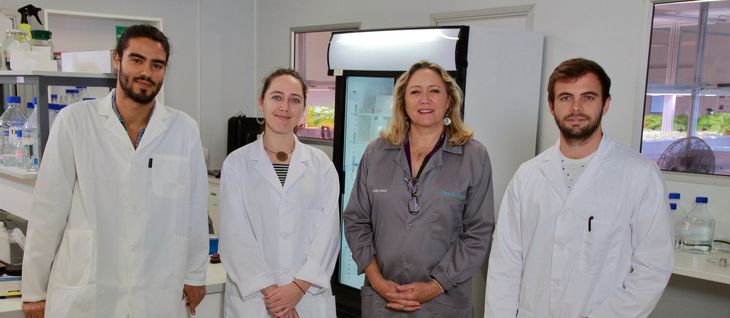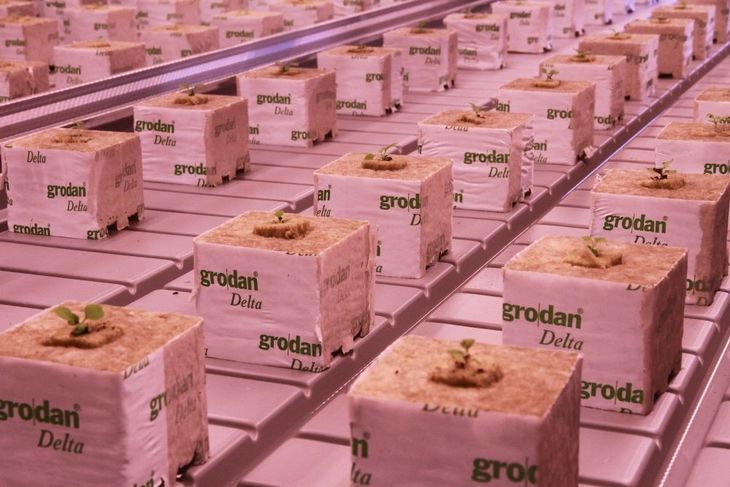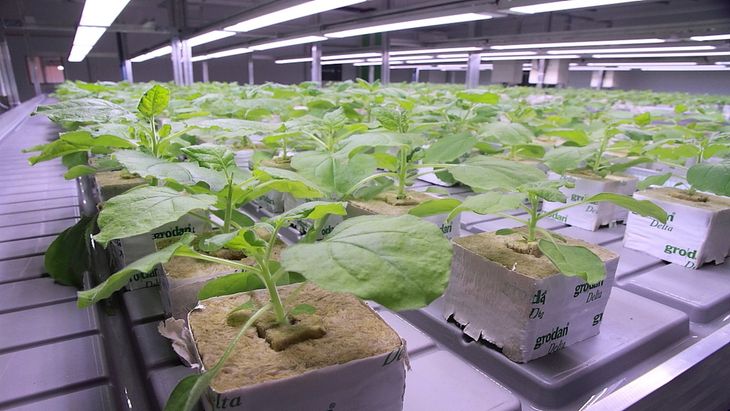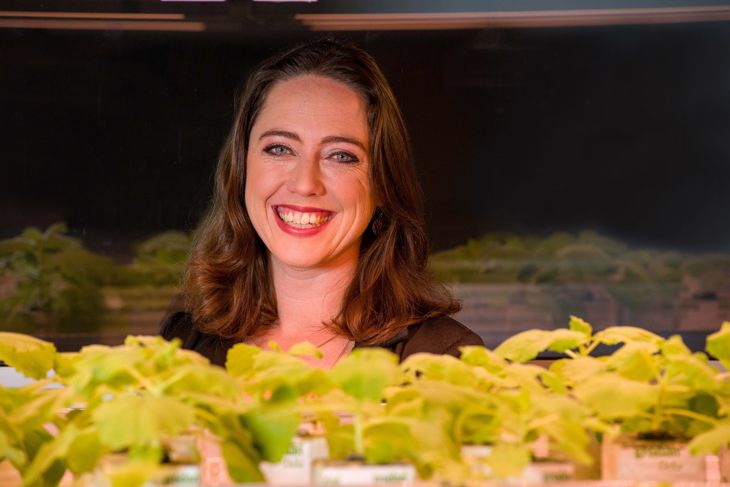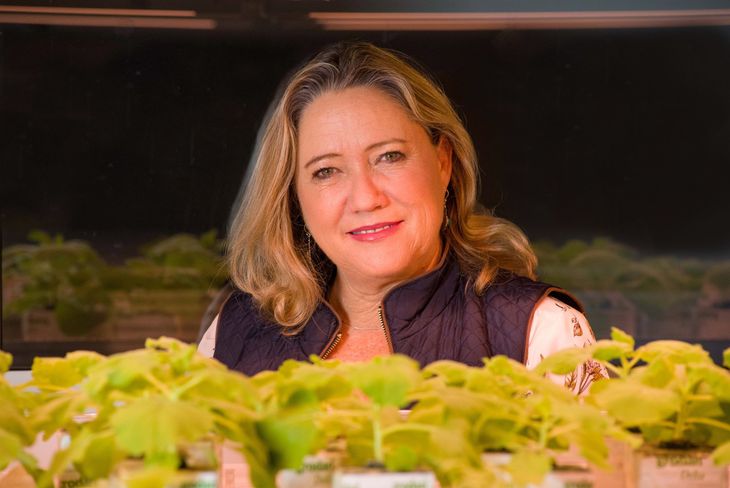plant-based protein production
is a proprietary plant-based expression platform to mass-produce recombinant antigens and antibodies for use in diagnostics relevant to the SARS-CoV-2 virus.
Under development by Cape Biologix (Pty) Ltd., Cape Town, a subsidiary of Cape Bio Pharms (Pty) Ltd.
The European Investment Bank (EIB) and the Foundation for Innovative New Diagnostics (FIND) have announced
on December 18, 2020 that they will fund the company with EUR 33.3 million and EUR 3.2 million respectively.
plant-based protein production
Cape Biologix (Pty) Ltd. , a subsidiary of Cape Bio Pharms (Pty) Ltd. uses its proprietary plant-based expression platform to produce recombinant antigens and antibodies relevant to the SARS-CoV-2 virus. Nicotiana benthamiana plants, a close relative of tobacco, are used to produce recombinant proteins in plants.
The S1 portion of the Spike Protein of the novel corona virus has been chosen as the antigen of choice, with the N protein also in development. This is due to the S protein being less conserved than the N protein. The gene for the ACE-2 receptor, that the RBD domain of the virus uses to attach to and infect cells, has also been ordered. These antigens and antibodies can be conjugated at a genetic level to a His tag, Rabbit Fc, Human Fc, or HRP/eGFP proteins depending on final application.
These proteins can be utilized on lateral flow devices for rapid detection of anti-IgM/anti-IgG antibodies against SARS-CoV-2 in patient blood, as well as detecting the virus with specific antibodies. Laboratory and clinic-based serology testing can also make use of these proteins as testing reagents. The proteins are being produced for the local South African and Sub-Saharan market. Excess production capacities can be distributed to the world market.
Signature Event of the
Financing Contracts COVID-19 immunologic plant-based manufacturing
COVID-19 immunologic plant-based manufacturing
A short version of the recorded live event held online on December 18, 2020 can be found below, the full length event is documented here.
Speeding early detection and prevention of COVID19 with the help of plants
our insight of the week - October 27, 2020
Team Cape Biologix, photo courtesy company
More than 18,000 South Africans are known to have died of COVID-19 while the country has seen 700,000 confirmed cases, making it the most affected on the continent.
Yet, while President Cyril Ramaphosa is rightly warning against complacency in the face of any "second wave", South Africa has made considerable progress in at least suppressing the novel coronavirus. It has, for instance, carried out around 4.5 million tests.
Cape Bio Pharms (CBP) is here playing what we see as a key role in researching and producing the SARS-Cov-02 spike reagents such as antigens and antibodies that are used in rapid diagnostic test kits. And it can report substantial progress in the last few months.
As we know or should know by now, the best way to manage a pandemic like COVID-19 is with early detection and/or prevention through testing – and the South African regulator, SAHPRA, has just approved a locally manufactured test kit using our proteins, enabling these kits to now be distributed throughout sub-Saharan Africa. "This is great news, as it’s the best validation we can have that our proteins can now start making a real difference. It’s very exciting," say in unison, Belinda and Tamlyn Shaw, the mother-and-daughter duo running CBP. These antibody kits can quickly tell you if you’ve had the virus, providing a footprint of past infections - a critical tool in disease management.
Team Cape Biologix, photo courtesy company
Cape Biologix Technologies is the manufacturing subsidiary of the company which, over the last few months, has tripled their production capacity and can now produce more than 5000mg of protein a month with a grow room capacity of 25.000 plants (for leaf mass). This scaling-up is now 95% complete. At the same, the number of staff, including key scientists, has risen significantly to 30. "We are now at go time," say the Shaws.
With the prospect of getting a test reading within just quarter of an hour, Cape Biologix expects to be able to see a greater scale of testing at community level in South Africa and in the wider region. The company has a mission of being able to provide antigen tests kits for low-and middle-income countries (LMICs) that can, normally, least afford them. A key aim is to devote 40% of their protein output to LMICs.
In India, which is a huge market, their SARS-CoV-2 proteins are undergoing R&D with three local rapid diagnostic test kit manufacturers, and in Canada they have finalised collaborations to produce and purify large volumes of their plant-made proteins . Indeed, Cape Biologix is spreading its wings far and wide in international collaboration, including working with renowned scientists and researchers at the University of Vienna.
This means ever-closer partnership with local test-kit manufacturers in the drive to reduce prices and make them affordable everywhere. The critical thing here, say the Shaws, is the next phase - supplying the antibodies to the kit manufacturers as swiftly and cheaply as possible. This will mean that in 15 minutes you will know if you have the virus, far cheaper and more accessible than the standard lab-based PCR tests. They hope to have everything in place by the end of next month (November).
And the future cannot come too soon for the Shaws who are passionate about scientific research. Their ultimate vision is to see bio-security for Africa. To get to this lofty goal they hope to eventually move into vaccines, therapeutics and biosimilars with an even bigger facility and to create even more jobs – like for the 20 unskilled and unemployed people they've recently taken on.
The future also needs nourishing, they say. So they have linked sales of their protein to the planting of new trees through partnership with Greenpop, a non-profit body from Cape Town that aims to restore ecosystems, including forests, throughout sub-Saharan Africa. And the Shaws are planning a special donation scheme to help schools set up labs and inspire young scientists across South Africa.
October 27, 2020 by ACUMEN
Accelerating supplies of rapid diagnostic test kits
Our insight of the week - July 24, 2020
University of Cape Town with Table Mountain, photo Adobe Stock
Here's what happened in recent months at Cape Bio Pharms. It is now two months since we last spoke to Belinda and Tamlyn Shaw, co-founders of Cape Bio Pharms in South Africa, but Spring already feels more like a year or more ago. In the COVID-19 pandemic, history is made every day.
In the meantime countries around the world have entered and exited confinement or near as damn it: In New Zealand there are still virtually no new cases since quite some time, in Europe countries are using color codes to mark the regions that are safe for travel or not, the U.S. is “recovering” from the initial surge in New York.
The global epicenters in Wuhan, Lombardy and New York have indeed diminished. On July 24, though, WHO has reported the highest number of new cases per day ever, resulting from massive growth in the United States, Middle- and South America, in the Asia-Pacific region as well as in sub-Saharan Africa. And the coronavirus knows no borders: there are over 15.5 million confirmed cases so far and over 630,000 deaths worldwide (July 25, 2020, Source: WHO) as the deadly virus spreads, while research on the long-term effects of virus raises concerns.
In sub-Saharan African countries, transmission is accelerating thanks to the lack of proper sanitary capacity but also insufficient data that could show where the hotspots are and where to focus action. Public health authorities could make more informed decisions if they had a footprint of where the novel coronavirus is or has been.
Belinda, CEO of Cape Bio Pharms, is utterly versed in COVID-19's evolution and how “developing countries are often at the end of the queue” when it comes to availability of new drugs, vaccine manufacturing and trials as well as any policy measures or tools that high-income countries have already been deploying. We know there are 626 unique therapeutic and vaccine candidates in development, of which 223 are in clinical trials – almost entirely in the industrialized world though South Africa is home to two vaccine trials.
Francisco Pera, Tamlyn Shaw, Belinda Shaw, Scott de Beer, photo courtesy Cape Bio Pharms (Pty) Ltd.
Changing the world
The team at Cape Bio Pharms is determined to change that. They have been perfecting their plant-based proteins used in rapid diagnostic test kits that are able to detect antibodies and confirm if a person has been in contact with the virus.
Ever since we last spoke Cape Bio Pharms has been working intensely to increase output yields through optimising their indoor hydroponic systems, protein purification and scaling up: they can now produce gram quantities of protein instead of milligrams. For manufacturers in the area this is manna from heaven. What's more, the tests that use Cape Bio's plant proteins have outperformed many other diagnostics tests, with their S1-His protein achieving specificity of 100% and sensitivity of 94% (IgM) and 100% (IgG) so far.
Now it’s up to SAHPRA, the South African Health Products Regulatory Authority, to give the green light so that the tests can be finally used in South Africa, the last step before starting distribution in the wider region. The government is also providing funds to help boost production of diagnostic reagents.
Young plants @Cape Bio Pharms, Cape Town, photo courtesy Cape Bio Pharms (Pty) Ltd.
“We want to provide community scale testing for Africa, to make it available as widely and as affordably as possible.” says Belinda. Nowadays, the price of tests can range from $20 to as much as $850 in the U.S. which is unaffordable even for them. Belinda is examining options to bring the price of the tests down even further to below two dollars, obviously a more bearable cost.
Her company is also exploring other opportunities and needs. “Even if we are still waiting for deployment in Africa, we are not stopping here,” she says. “We are discussing with manufacturers in India, who we all know have great production capacity, but also a real need for affordable and well-performing tests in large quantities. We wish to support them because it is crucial to counter the spread of COVID-19 as soon as possible”.
Meanwhile, daughter Tamlyn, Director of Scientific Services, and her team including their two talented lead scientists: Scott de Beer and Francisco Pera are working towards developing test kit 2.0. which will also reveal if a patient is infected by picking up the virus within patient samples. This is excellent news for Cape Bio Pharms and shows the potential of their plants – and their individual and collective knowhow and expertise. The platform they are currently perfecting could provide proteins for other diagnostics areas which are crying out for attention in Africa such as HIV and malaria.
Asked what lies beyond the COVID-19 mission, Tamlyn is excited to share the plans: a bigger laboratory, more machines and tools and a bigger team. Last but not least the long-term plan is to build a new cGMP compliant plant-based Cape Bio Pharms facility that will allow them to finally move into producing vaccines, biosimilars and therapeutics.
“We are extremely pleased with the progress made so far and I am confident that this is only the beginning. Our plant-based protein production platform is clearly demonstrating its flexibility and speed to market and that plants could be key in fighting not only COVID-19 but also other diseases,” declares a confident Tamlyn.
July 24, 2020 by ACUMEN
“Plants allow for faster and cheaper production of proteins for COVID-19 tests"
plant-based protein production
- our insight of the week
Cape Bio Pharms grow room in Cape Town / South Africa
Mother and daughter Belinda and Tamlyn Shaw speak to us from their offices in Cape Town, where they are developing a powerful tool in the battle against COVID-19. Proteins used in diagnostic test kits usually come from mammalian cell cultures, but Cape Bio Pharms is using cells derived from plants instead.
When news of the novel coronavirus broke, Belinda Shaw, co-founder of Cape Bio Pharms and a former environmental journalist, experienced a "eureka" moment, racing to find the genome sequence of SARS-CoV-2. She knew that the sooner they had the genome the sooner they could propose a solution – propriety plant-based antigens and antibodies – against COVID-19.
Cape Bio Pharms is a platform that grew naturally from the Biopharming Research Unit (BRU) of the University of Cape Town, South Africa, with the aim of providing a commercial solution for producing recombinant proteins in plants, specifically the Nicotiana benthamiana plants ('benth', a close relative of tobacco).
Tamlyn Shaw, Co-Founder and CSO of Cape Bio Pharms
“By using plants as a bioreactor, compared to traditional mammalian cell culture systems such as yeast, bacteria or eggs, we have a rapid response to disease management. Our approach allows flexibility in designing assays for diagnosis as well as research. The test kits produced are not novel; however, there is now a huge demand globally. Our plant-based system ensures we can react quickly and produce large quantities of antigen rapidly. It is this rapid response and flexibility that makes our platform unique.” Tamlyn Shaw, co-founder of Cape Bio Pharms.
The company is using its plant-based platform to produce spike proteins which are used in serology tests that can detect antibodies – via finger-prick blood samples– and signal whether someone has been exposed to the virus, in an extraordinarily rapid response time of five minutes or less. The team at Cape Bio Pharms relies on its plant-based expression platform to produce the proteins within just a few weeks. With an estimated 2 micrograms of protein per test kit, they plan to scale up their capacity over the next few months to produce enough protein for 20-million kits a month by December 2020. Their focus is on optimizing their purification techniques which could result in double the amount of protein being produced. Cape Bio Pharms is partnering with test kit manufacturers by supplying the raw protein for them to make the kits.
This is a major game-changer as this test kit is quick to produce and reveals remnants of the coronavirus in people. It complements PCR-based testing, the current gold standard of COVID-19 testing, but Cape Bio Pharms says complete testing should involve a combination of the two as each has its shortfall. The two go hand in hand and should be produced on the same scale. While the PCR detects the presence or absence of the virus in sputum samples, the protein diagnostic test kit flags antibodies even if a person is asymptomatic or has completely recovered from the infection. This is critical to allow people to get back to work, but it still does not mean they are immune to repeat infection.
The kits are now at validation stage by the rapid diagnostic kit manufacturers, and Cape Bio Pharms says it is receiving positive results so far. Should the tests pass the this stage, the South African Health Products Regulatory Authority (SAHPRA) must grant approval. Manufacturing can then start and allow millions of people to be tested and protected.
Belinda Shaw, Co-Founder and CEO of Cape Bio Pharms
Belinda Shaw reflects on the race against COVID-19: “It’s a roller-coaster with so many immediate and pressing issues to deal with, but this is easy to handle by taking a pause, a deep breath and focusing on the mission – providing protein that can create millions of rapid diagnostic test kits, thereby offering a powerful tool to manage and hopefully contain the spread of the virus. In the end, this is about saving lives and contributing to kickstarting the global economy.”
May 15, 2020 by Acumen

